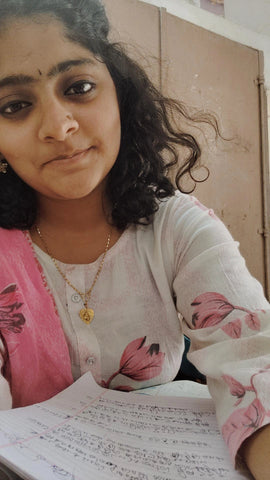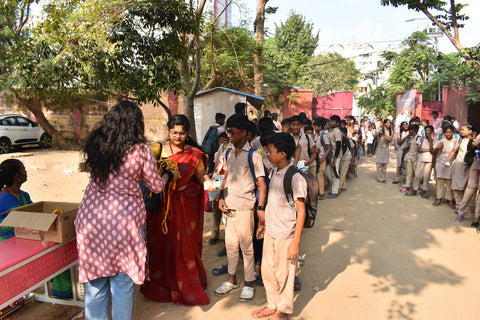Your cart is currently empty

Before I actually met Sripada Muralikrishnan, a 22 year old teacher who hails from Chennai, I had a rough idea of who she was and what she did. I knew she was a young teacher and that her teaching methods were a bit unusual. As someone who almost went down the teaching path, I wanted to know more about her. I interviewed her as part of our Fearless Femme feature, a space where we feature women who’re not afraid to do their own thing.
When I ask her how she got into teaching, she jokingly recalls how growing up, she was less than fond of children. Things changed in her teenage years when she noticed some concerning behavioural changes in her 3 year old cousin-sister.
“The dysfunctional family dynamics took a toll on her and she became quiet. To help her, I conducted some research and spoke to my college counsellors for guidance. Her parents and I started giving her all the love and affirmations we could and slowly, things got better. That’s when I started believing in the maxim, Love can change everything”.
It’s also how she realised that she wanted to make a change. So right after finishing her undergrad, at age 20 she became a teacher for 6th and 7th standard.

Her social media reflects her age as well as her new take on teaching. Her instagram is full of delightful reels and captions about her experiences as a teacher. Her enthusiasm and genuine affection for her students is evident in these snippets. More than anything, she comes across as a “fun” teacher. While introducing herself she admits her love for music, dancing and reading. She also tries her best to foster creativity in her students–for example through Project Dhairyam, an event centred around the idea of ‘art meets confidence’. She tells me more about how and why she conceptualised this project.
“Art integrated education is really important for our children right now. Every single one of my students is curious, talented and enthusiastic to learn. What they lacked was confidence. I realised that children need validation and that’s when Project Dhairyam began. Initially it was a bit difficult to get them on board because they didn’t understand it. But with the right guidance they started getting involved. Ultimately, I let them decide what they wanted to do– we had an open mic, stand up, theatre, short films among others! It was a success because they actually wanted to learn. Art integrated education makes it easier for them to transition to a learning space.” She ends by saying that her students were happy, so she’s happy.

Perhaps it is this genuine care for her students that allows her to go the extra mile for them. We continue talking about how it’s important to make a classroom as inclusive as possible. Every student matters and every student is a star (her words). All questions are valid and welcome. Whether it is about gender equality or periods, every conversation with her students is as honest as possible. She says it’s important to accept that, “we cannot try to control or rule them with fear. We have to listen and treat them with respect.” I wondered where she was when I was in school…
Speaking of respect, I ask her to share some examples of how she propagates gender equality in the classroom and how her students respond:
“I try doing it through the little things. I use gender neutral pronouns even though the textbooks use he/him. I keep changing the seating plan and make boys and girls sit next to each other. I try having open, casual conversations with them. It’s important to remember that they’re very young and too many strong opinions or rules will confuse them, so I must meet them at their level. Their response is usually positive. Sometimes they do question me because the realities they have observed are so different from what I’m saying. The girls will share examples of how they are told to do housework when their brothers are exempt. The boys will point out how they receive much harsher punishments than the girls. Honestly, I don’t always have a perfect answer for them. But I make it a point to at least have a conversation about it.”

It’s clear that she’s not afraid to make choices that might set her apart (a shuffled seating plan may not seem revolutionary, but I remember the drama caused by girls and boys sitting together. In a co-ed school in a metro city no less!).
Further, incorporating they/them pronouns is not a standard practice in Indian schools either, let alone for classes as young as 6th and 7th. Sriprada does hint at possible backlash but makes it clear that she’ll continue doing what’s best for her students. At this point I confess that if I could go back to being a student, I’d want to be in her classroom and she laughs. It’s true though. She represents a new tribe of teachers who’re doing their best to ensure that future generations receive the kind of care and support that they themselves did not receive in school.
We then get into her approach to period education in the classroom. While I don’t remember periods being discussed in my school, it was not as much of a taboo among my classmates and teachers. Sriprada’s experience is different. She admits that even now when she talks to her students about periods, she’s acutely aware of the stigma attached to it. She shares one particular incident of talking about periods in class–
“There’s an interesting system of handing out sanitary napkins in school. The girls are asked to form a line and hold out their bags. One day when the girls stepped out to receive their pads, the boys asked me what’s going on and why they’re not included. So I sat them down and explained Periods. I told them the biological process and why women use menstrual products. Some of them knew about the products because they’d them for their mothers. But they all said that while I explain and encourage them to not shy away from this topic, other adults get angry with them. It’s tricky. Instead of being on-the-nose and making them uncomfortable we have to include these topics as seamlessly as possible. So I have started telling them when I have cramps. I’ll say that my stomach is hurting because Sri Miss is having her periods. Initially, they’d be a bit stunned. But now they’re more comfortable– they’ll ask me to sit down, make sure I’m alright. They’re learning how to be supportive to their classmates as well.”
It’s a big achievement to make adolescents comfortable with a tabooed subject like periods. Despite the relative openness of my teachers, I remember that boys in my school were never taught or encouraged to learn about periods. In fact, there were little to no consequences for them when they teased or misbehaved with their classmates who did have periods!
My next question to her was about the challenges she faced while talking about gender/periods or sex-education with adolescents. Her answer made me feel hopeful and disappointed at the same time.
“It was never hard for me to have a conversation with my students. The challenges that I face are because of adults. See, when you try dealing with topics which are a bit difficult and have a taboo attached to them, it’s going to require some experimenting. People will object and the moment that happens, the adults respond with, See? this is why we don’t talk about these things! They (adults) are not willing to make mistakes, which is important in order to learn how to include these topics in the classroom. Another challenge is the willingness and ability to answer questions. The students are very curious. They will have a million questions and it’s important to commit and be ready with answers, which isn’t always the case. All the other issues are minor, the main challenge is getting the adults to accept it.”
While she’s confident that all other issues are minor, she does acknowledge the day-today issues of this profession. Addressing the health impacts of teaching, she says–
“It’s mentally and physically taxing. My voice box is gone. Even the temper tantrums take a toll on you. Sometimes I’ll literally be in tears and I have to step out so my students don’t see me like that.” She doesn’t give up though, or show any sign of wanting to. She knows with utmost clarity that she’ll always continue to advocate for students. And with her instinctual understanding of what they need, I’m grateful that she wants to continue working in Education.
I keep thinking back to when she said, “What children need is love and validation, so why not give it to them?”
Sriprada believes her students can learn about anything–from gender equality to sex education– if taught with love and patience. It’s a simple yet transformative philosophy. Her resolute commitment to ensuring that every student receives a kinder and more efficient education is not just inspiring, it’s practically infectious.
-------
About the author:
Rai (she/her) is a writer who’s fond of buying books and forgetting to read them. She has a knack for getting distracted by anything including her own thoughts.
-------












